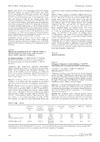Identificador persistente para citar o vincular este elemento:
https://accedacris.ulpgc.es/jspui/handle/10553/105872
| Título: | Efficient and customised use of IOTA ADNEX model as a clinical management tool in a tailor‐made treatment of adnexal tumour suspected of malignancy (VP61.05) | Autores/as: | Medina Castellano, M. Amaro Acosta, A. Quevedo Gutiérrez, Eduardo Gregorio Marrero Callicó, Gustavo Iván Santana Del Pino, Ángelo Laseca Modrego, M. García Hernández, J. Martín Martínez, Alicia |
Clasificación UNESCO: | 3201 Ciencias clínicas | Fecha de publicación: | 2020 | Publicación seriada: | Ultrasound in Obstetrics and Gynecology | Conferencia: | Virtual World Congress on Ultrasound in Obstetrics and Gynecology (ISUOG) | Resumen: | Objectives Validate in a reference cancer centre the ADNEX model, focusing it as an efficient tool that customises the pre‐surgical approach of patients with suspicion of malignant ovarian tumour. Methods Prospective study, in a national health tertiary hospital, between 2018‐20. Patients scanned on suspicion of malignant ovarian tumour, methodology defined by IOTA, certified explorer. IOTA ADNEX model variables were analysed, adding Doppler colour score. A threshold of 20% was considered, non‐adjusted odd‐ratio value is highly statistically significant (99.667) with a 95% CI. P < 0.05 considered significant. Those whose risk >20% were referred to our oncology gynecology unit. Risks 10‐20% were scheduled for surgery in a general gynecology theatre, with intraoperative biopsy, counting on skilled gynecologic oncologist on alert. Results Malignity rate 46%. According to malignant relative risk, there was a good correlation in II‐IV stage (69%) and borderline (61.9%). The worse was given in metastasis (22.2%). The cyst subtype mostly associated with II‐IV tumour is the solid and multilocular solid, being for borderline tumour, multilocular solid and unilocular solid. Of 400 patients referred, were excluded malignancy risk 10% and who have no surgical indication, leaving 272 patients. Only 3 false‐negatives were found in the group considered benign with surgical criteria, 3/147 (98% accuracy), all of them borderline tumours with a priori risk of 15‐20% so intraoperative biopsy and optimal oncological surgery were performed in the moment. In malignant group, 33 false‐positives were found (73.6% accuracy) which were: benign solid tumours (fibroma), non‐gynecological malignant/benign tumours, inflammatory necrosis. Conclusions ADNEX model is essential for customised treatment of adnexal tumours in order to efficiency and schedule oncological surgery. The best assessment of malignancy occurs in stage II‐IV tumour and borderline tumour. The worst correlation was found in metastasis, which are assessed by Doppler colour score, abdominal spread signs and patient's clinical data. | URI: | https://accedacris.ulpgc.es/handle/10553/105872 | ISSN: | 0960-7692 | DOI: | 10.1002/uog.23346 | Fuente: | Ultrasound in Obstetrics and Gynecology [ISSN 0960-7692], v. 56 (S1), p. 332-332, (VP61.05), (Octubre 2020) |
| Colección: | Artículos |
Visitas
293
actualizado el 27-sep-2025
Descargas
112
actualizado el 27-sep-2025
Google ScholarTM
Verifica
Altmetric
Comparte
Exporta metadatos
Los elementos en ULPGC accedaCRIS están protegidos por derechos de autor con todos los derechos reservados, a menos que se indique lo contrario.
